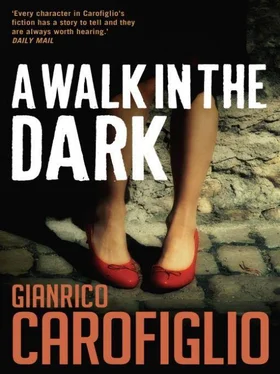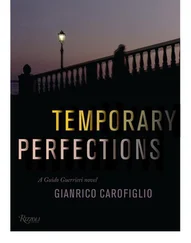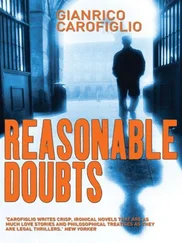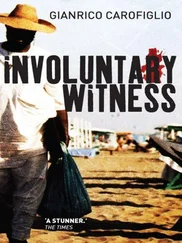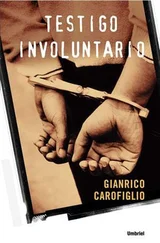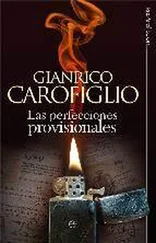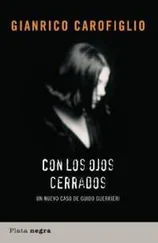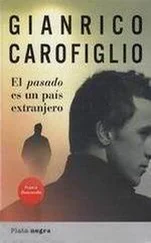Gianrico Carofiglio - A Walk in the Dark
Здесь есть возможность читать онлайн «Gianrico Carofiglio - A Walk in the Dark» весь текст электронной книги совершенно бесплатно (целиком полную версию без сокращений). В некоторых случаях можно слушать аудио, скачать через торрент в формате fb2 и присутствует краткое содержание. Жанр: Криминальный детектив, на английском языке. Описание произведения, (предисловие) а так же отзывы посетителей доступны на портале библиотеки ЛибКат.
- Название:A Walk in the Dark
- Автор:
- Жанр:
- Год:неизвестен
- ISBN:нет данных
- Рейтинг книги:5 / 5. Голосов: 1
-
Избранное:Добавить в избранное
- Отзывы:
-
Ваша оценка:
- 100
- 1
- 2
- 3
- 4
- 5
A Walk in the Dark: краткое содержание, описание и аннотация
Предлагаем к чтению аннотацию, описание, краткое содержание или предисловие (зависит от того, что написал сам автор книги «A Walk in the Dark»). Если вы не нашли необходимую информацию о книге — напишите в комментариях, мы постараемся отыскать её.
A Walk in the Dark — читать онлайн бесплатно полную книгу (весь текст) целиком
Ниже представлен текст книги, разбитый по страницам. Система сохранения места последней прочитанной страницы, позволяет с удобством читать онлайн бесплатно книгу «A Walk in the Dark», без необходимости каждый раз заново искать на чём Вы остановились. Поставьте закладку, и сможете в любой момент перейти на страницу, на которой закончили чтение.
Интервал:
Закладка:
Then she went and sat down in her place. Her face was a touch tense. Small lines at the corners of her mouth, her eyes partly closed. I was certain she’d already read Delissanti’s list.
The assistant who was with her placed two dusty folders on her desk, full of files with discoloured covers. A few minutes passed, and at last Delissanti came in, with his usual retinue of secretaries, assistants and trainees. Almost immediately after, the bell sounded to signal the start of the hearing.
They’d arrived virtually at the same time. The defence attorney and the judge.
It had to be a coincidence.
20
The preliminaries did not take too long.
The judge declared the proceedings open and asked the clerk of the court to read the charges – in full, as required by law. In practice, it isn’t usually done. The judge asks the parties, “Shall we take the charges as read?” Then he usually doesn’t even listen to the answer, and carries on. He takes it for granted that nobody is interested in hearing the charges read out, because they already know them perfectly well.
That day, Caldarola didn’t take the charges as read, and so we had to listen to all of them in the nasal voice of Clerk of the Court Filannino from Barletta, with his strong accent. A thin man, with greyish skin, not much hair, and a sad, unpleasant grimace at the corners of his mouth.
I didn’t like that. Caldarola was someone who, more than anything else, liked to get on with things. It was a bad sign that he should waste time on formalities. It must mean something, but I wasn’t sure what.
After the charges had been read out, Caldarola asked the public prosecutor to make her requests for the admission of evidence. Alessandra stood up, her robe dropping perfectly along her body as she did so, without her needing to pull it up over her shoulders. Unlike almost everyone else, including me.
She didn’t speak for very long. Basically, all she said was that she would prove the offences indicated in the charges by means of the witnesses on her list and the documents that would be shown in evidence. From the way she looked at the judge, I realized she was thinking the same thing as me. That something was going on behind our backs.
Then it was my turn, and I said even less. I referred to the public prosecutor’s requests, asked for the defendant to be examined, if he consented, and reserved my observations on the defence’s requests until I had heard them.
“Counsel for the defence.”
Delissanti stood up.
“Thank you, Your Honour. Here we all are, even though we shouldn’t be. The fact is, there are some cases that should never be brought to trial. This is one of them.”
First pause. He turned his head to the bench where Alessandra and I were sitting. Trying to provoke us. Alessandra’s face was devoid of expression: she was looking into space, somewhere behind the judge’s bench.
“A professional man, a reputable academic, a member of one of the most important and respected families in our city, has been dragged through the mud by false accusations based purely on the resentment of an unbalanced woman and-”
I almost leaped to my feet. I had risen to the bait.
“Your Honour, counsel for the defence cannot be allowed to make such offensive comments. Especially at this stage, when he should be limiting himself to requests for the admission of evidence. Please advise Avvocato Delissanti to keep scrupulously to the provisions of the law: to indicate the facts he intends to prove and to ask for the admission of evidence. Without comments.”
Caldarola told me there was no need to get excited. Anyway, it made no difference. The game was out of my hands.
“Avvocato Guerrieri, you mustn’t take things amiss. Counsel for the defence needs to explain the context and the reasons for his requests. How else can I tell if these requests are relevant? Please carry on, Avvocato Delissanti. Avvocato Guerrieri, let’s try to avoid any further interruptions.”
Son of a bitch. I thought it, but would have liked to say it out loud. Bloody great son of a bitch. What have they promised you?
Delissanti continued, at his ease.
“Thank you, Your Honour, you have caught my meaning perfectly, as always. It is indeed obvious that in order to introduce the aspects of the case to which our evidence relates, I must make certain preliminary remarks regarding these aspects. In essence, if we want to make – as in fact we will – a request for an expert psychiatric witness to be heard, then it is important to say, and to be allowed to say, that we are doing so because we consider the plaintiff to be suffering from serious mental disturbances, which compromise her credibility and even her ability to testify. Where such things are concerned, especially when the honour, the freedom, the very life of a man like Professor Scianatico are at stake, there is no point in beating about the bush. Whether the public prosecutor and counsel for the plaintiff like it or not.”
Another pause. Again he turned his head to our bench. Alessandra was as still as a sphinx. Though if you looked carefully, you could detect a very small, rhythmic contraction of her jaw, just below the cheekbone. But you really did have to look very carefully.
“And so before anything else we request the admission of evidence demonstrating” – he hissed the words, almost spat them – “that the plaintiff is suffering from psychiatric problems, which will be explained in greater detail by our expert witness, properly indicated on the list, Professor Genchi. A name that requires no introduction. In addition, we ask to be able to prove the continued existence of such problems, the reasons for the separation as verified at the time, and more generally a condition of severe social maladjustment and personal inadequacy on the part of the plaintiff, by means of the witnesses indicated on our list. We also request the examination of Professor Scianatico, who, I inform you as of now, gives his consent to being examined and to answering questions in order to provide further proof of his innocence. We have no comment to make on the public prosecutor’s requests for the admission of evidence. Nor those of counsel for the plaintiff, who doesn’t, in fact, seem to be making any significant ones. Thank you, Your Honour, I have finished.”
As soon as Delissanti stopped talking, Caldarola started to give his ruling.
“The judge, having heard the requests from both parties, and having noted-”
“I’m sorry, Your Honour, I have some observations to make on counsel for the defence’s requests for the admission of evidence. If you will allow me.”
Alessandra had spoken in a low but sharp voice, in which her slight Veneto accent was just noticeable. Caldarola looked a bit embarrassed, and I thought I also noted a touch of redness on his usually grey face. As if he had been caught doing something vaguely shameful. Which indeed he had.
“Go on, Prosecutor.”
“I have no observations on the request to admit the many witnesses indicated on the list. There seem to me to be too many of them, but that is not a matter I intend to raise. At least not for the moment. However, I should like to say something about the request to hear the testimony of Professor Genchi, referred to by counsel for the defence as an expert witness, a psychiatric specialist. I should like to raise a couple of points about this request. One specifically concerns the case with which we are starting to deal today. The other is of a more general nature, regarding the admissibility of such requests. Has Professor Genchi ever visited Signora Martina Fumai? Has the professor ever at least seen Signora Martina Fumai? Counsel has not informed us of the fact, even though he has told us with great, emphatic, indeed offensive certainty that Signora Martina Fumai is unbalanced. If, as I believe to be the case, Professor Genchi has never visited the plaintiff, I wonder what he could possibly base his expert testimony on. Because counsel for the defence, infringing the essence of the duty of disclosure, has not told us. And this remark brings us to the second point I should like to raise. Is it possible to request a psychiatric evaluation of a witness – or even a defendant – without there being any element in the documents which may allow one to presume that such an evaluation is necessary? I believe this general point needs to be addressed before any decision can be made on counsel’s request. Because, Your Honour, to admit such a request without it being based on any factual element of the case creates a dangerous precedent. Every time we don’t like a witness, for whatever reason, good or bad, we will be able to ask for a psychiatrist to tell us about his or her most private, most personal problems. And who among us does not have personal problems, depression, addictions? To alcohol, for example. Do these problems not concern only themselves and should they not legitimately remain of concern only to themselves?”
Читать дальшеИнтервал:
Закладка:
Похожие книги на «A Walk in the Dark»
Представляем Вашему вниманию похожие книги на «A Walk in the Dark» списком для выбора. Мы отобрали схожую по названию и смыслу литературу в надежде предоставить читателям больше вариантов отыскать новые, интересные, ещё непрочитанные произведения.
Обсуждение, отзывы о книге «A Walk in the Dark» и просто собственные мнения читателей. Оставьте ваши комментарии, напишите, что Вы думаете о произведении, его смысле или главных героях. Укажите что конкретно понравилось, а что нет, и почему Вы так считаете.
